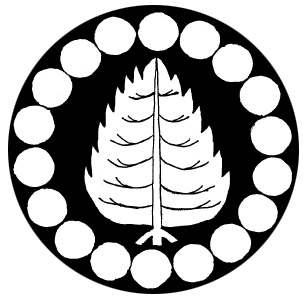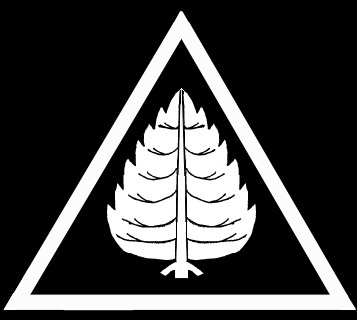|
We are the Clan of Matsuyama. The people of the "Pine Mountain".
Our strength is that of the mountain; enduring, grounded and majestic.
Our spirit is that of the pine tree; ever alive and
growing, resilient, noble, and calm.
This is the record of our way.
The Five Principles
Harmony - Members of the clan are expected to strive for the greater good and work for peace, respect and cooperation with all those around them - both in the Society and in mundane life.
Altruism - Compassion is the highest virtue. Within their means, members of the clan are expected to regularly give funds, materials or time to the charitable cause of their choice. In addition or as an alternative, they may perform volunteer work within the Society.
Simplicity - We strive for simplicity and elegance in our lives. Do not over-complicate the things you do. Do not over-extend yourself or turn your efforts into fanatical martyrdom. If you need help, seek it. If another needs help, give it. Simplicity leads to harmony. This is what we mean by "common sense".
"If you take on too much without a solid foundation, you will eventually be drained, leaving you with embarrassment and bad luck." - I Ching
Growth - Members of the clan are expected to invest time and effort in bettering themselves and the group. No matter what you do, do it with a whole heart and become your chosen art. Learn. Growth brings honor and praise to you and to the clan. This principle also applies to living "the Dream" of the SCA. We wish to experience a rich pageant of Medieval culture. We learn by doing. This also includes "good schtick". If something will add fun and color and allow people to indulge themselves in their personas, do it. All within reason, of course. Balance this with the principle of Simplicity.
Giri - Members of the Clan are expected to demonstrate the Japanese principle of Giri. Giri means "honorable obligation". It is a single concept which encompasses honor, chivalry, loyalty, courage and "doing what is right".
Commentary on The Five Principles on Altruism on "Good Schtick" on the "Current Middle Ages
Symbols
Mon - The mon of the clan is a Japanese-style cedar tree inside an equilateral triangle symbolizing the mountain which is our home.
Colors - The chosen colors of the Clan are Black (for sincerity, depth and calm), White (for purity), and Gold (for nobility, richness and prosperity). And besides, the Oyakatasama likes them.
|
Nobility
Prosperity
Richness
|
Purity
|
Sincerity
Depth
Calm
|
|

|

|
|
Mon of the Daimyo, Matsuyama Mokurai
|
Mon of the Clan of Matsuyama
|
Displaying the colors and the clan mon - Although we will register our mon with the SCA college of heralds, use of the clan mon and colors is essentially Japanese. This means that contrast is a useful thing (such as on the battle field) but western heraldic rules about contrast need not be adhered to at all times. Members may display the mon in gold on white, for instance. Mon were originally nothing more that fabric design motifs, so they may be used as such. They may also be rendered in different ways for different purposes. For example, our mon of the tree in the triangle could be rendered in more sophisticated ways for art projects; perhaps using a mountain shape instead of the triangle, or embellishing how the tree is drawn. Likewise, other colors may be used when drawing the mon. If your personal heraldic color is blue, but you want to show clan loyalty by putting the mon on your garb, you may render the mon in blue. You may also combine your heraldry with the mon in a joint display (again, this is very Japanese). Be creative, but keep in mind that the basic mon and the official colors will be the ones used for the field, camp banners, markers, key ceremonial garb, etc. Please ask the Oyakatasama or his Okugatasama for help, ideas and examples.
The Scroll of the Ancestors - This is a special historical object, typical of Japanese families. It is a list of the names of members of the Clan. The Matsuyama scroll will contain the Japanese names of all members, the date of their naming ceremony, as well as the date of their funeral should they "pass on." The Clan's ancestry stems from the great clan of Kuji ka Oni Musashi, the daimyo who elevated our clan to its current status and granted us land. Beyond him, our ancestry dates back to the great samurai hero Minamoto no Yoshitsune. Unfortunately, all of our scrolls relating the exact line of decent were lost when the original temple repository burned. A great loss. However, Yoshitsune's name still appears as the first entry on our current Scroll of the Ancestors.
Points of Giri
For the Oyakatasama (House Lord) and Okugatasama (House Lady) to the Clan
- Strive to exemplify the Five Principles.
- Guide the clan's focus and keep the Five Principles alive with concrete actions, projects, events, awards, etc. Create new clan rules to this effect, but only as needed and with the input of the clan members.
- Provide ceremonies for the clan such as the annual gathering, naming ceremonies, and funerals.
- Honor clan members' deeds.
- Maintain the Scroll of the Ancestors.
For clan members to the Oyakatasama and to each other
- Uphold the Five Principles.
- Utilizing the Five Principles, uphold the honor of the clan and its members. Show our unity.
- Develop a Japanese persona. This may consist of just a name and one set of garb to start.
- Attempt to attend clan functions.
Commentary On Free Speech On Being a Member On Being New
On Accuracy/Historical Re-creation
Ceremony
The Naming Ceremony - At this function, a new member of the clan is officially inducted. Their Japanese name is announced to the clan and they will have their name entered into the Scroll of the Ancestors. They will be presented with the following gifts from the daimyo:
- A piece of Japanese garb.
- The Clan Mon - This will be a favor - the clan mon on a small disk or other object suspended from a black, white and gold kumihimo braid.
- The "Sword" - The new member is given an honorary "tool of their trade". For samurai, this will be a sword or other weapon. For those following other paths, other appropriate objects will be presented (a brush for a painter for instance). "The sword is the soul of the samurai."
The ceremony concludes with the new member being saluted by the clan as a whole. Details of the ceremony will depend on the daimyo. Sometimes it may be a formal, pomp-filled affair. At other times it may be a simple tea ceremony.
Funerals - Anyone who permanently leaves the clan for whatever reason (good, bad or indifferent) will be considered to have "passed on". A funeral will be held and the individual will be respected as an honored ancestor of the clan. Their Japanese persona will be retired and that name will not be used again by any other members. The daimyo will officiate at the funeral. The date of the funeral will be marked next to the individual's name in the Scroll of the Ancestors.
Commentary On Ceremony On Accuracy
Titles, Offices and Rank within the Clan
Terms of Address
For purposes of terms of address and titles, the Clan is currently using those described in Anthony J. Bryant's Complete Anachronist, "A Japanese Miscellany". It is the general opinion of our Clan's scholars that Bryant-san's suggestions on what SCAdian peers and armingers of the Japanese persuasion should be called are good ones. Unlike the suggestions/approved Japanese titles currently used by the Laurel King of Arms, Bryant's suggestions ARE period (the approved titles are all Meiji-jidai; 19th cent.).
Following is a list of some of the terms. For a complete list, please purchase a copy of Bryant-san's CA.
Biku/Bozu - Buddhist monk
Danna - equivalent of "milord" or "sir"
Dono - appended to the first or last names of men or women worthy of respect regardless of titles or offices held
Gimi - appended to given names of titled males
Gozen - appended to the given name of women of rank
Hime - appended to the given name of titled females. Also used alone, the equivalent of "Milady"
Hime-gimi - female peers; appended to given names
Meijin - address for a peer; "master" in terms of an art Wake is the appended form
Obugyo-sama - generic form of address for any officer below kingdom level
Ojosama - "miss" (untitled)
Okusama -- "madam" (untitled)
Okugatasama - address for the Lady of the household
(what Akiame should be called by the members of the clan, not outsiders)
Oyakatasama - address for the lord of the household
(what Mokurai should be called by the members of the clan, not outsiders)
Tono - address for one's lord whether in terms of a clan or landed nobility.
Waga-kimi - address for a husband or a liege lord
Please Note: Upon reading these suggestions carefully, you will find that sometimes they refer to titles that can be used alone. Sometimes they must be used with names. Sometimes they are terms of address and sometimes they are terms of reference that would never be said directly to the person in question. Remember that everyone in Japanese society is defined by who they are in relationship to someone else. So this point is very important. It's not enough to just have "sir" and "ma'am" and nothing else. As you approach a Japanese persona, give some thought to how you would address them in period based on your realtive positions in society. This is all part of "good schtick". It is also respectful and polite.
Rank and Offices
While rank is an important factor in Japanese society, ranking is not currently in wide-spread use within the Clan. We prefer to keep things relatively egalitarian to preserve harmony. (a modern concession for dealing with modern American personalities, we admit) However, for an offical occasion, or just because you wish to, you can use appropriate terms of address as you see fit.
Many members of the Clan do hold an office. The office describes the member's chosen area of interest, special skills, desire to serve the Clan, aspirations, etc. Offices are chosen by the member with the consultation and approval of the Daimyo.
Some Notes on Names
If you are new to the Clan and working on a Japanese persona, keep in mind that you do not have to have the name "Matsuyama" in your name. Most adherants to a given household in period were descended from different lineages. Some were related to the Lord of the Clan, others were not. Some married into the house but would be known by their own familial name or simply by their rank, title or occupation within the Clan. Any of these scenarios may apply to you. If you have a persona story in mind, let us know.
Here is an example: Our Clan's Mistress of the Wardrobe is Fujiwara no Aoi. Her name, Fujiwara, was that of a great and ancient family in the Heian court. But the name was also rather common due to the many links the Fujiwara's made to other groups in their political marriages. As a member of Matsuyama, Fujiwara is known generally as "Fujiwara". She shows her Clan affiliation when she writes her name by including the characters for "Matsu" and "yama". She can also use office names and rank to describe herself in different settings. Thus, she can be Mastuyama Clan's Fujiwara no Aoi, who is also part of the Imperial Court Tailor's Guild.
As you can see, it can become rather complex. Again, if you have questions or ideas you wish to share with us, don't hesitate.
|